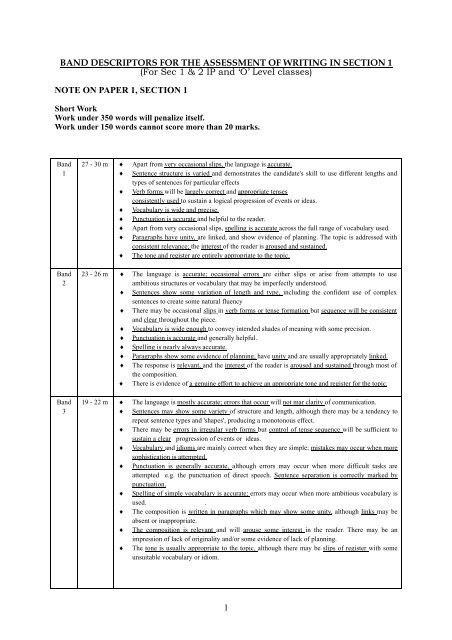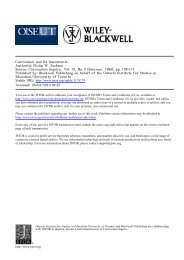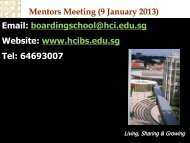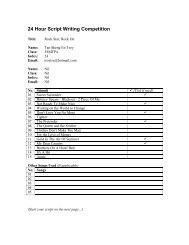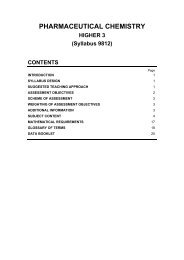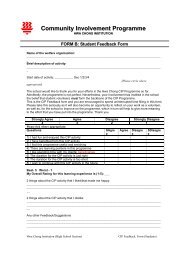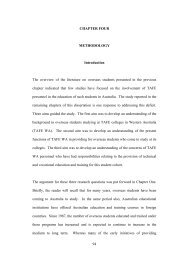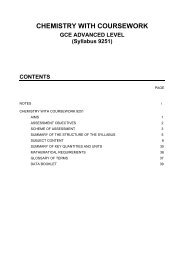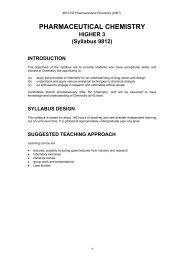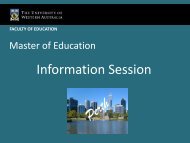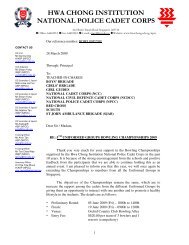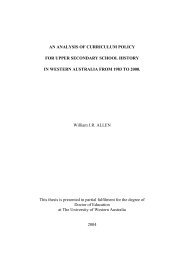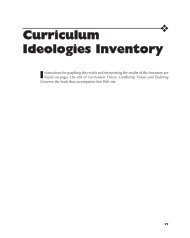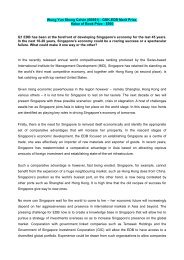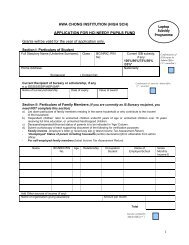Free Writing Rubrics
Free Writing Rubrics
Free Writing Rubrics
You also want an ePaper? Increase the reach of your titles
YUMPU automatically turns print PDFs into web optimized ePapers that Google loves.
BAND DESCRIPTORS FOR THE ASSESSMENT OF WRITING IN SECTION 1<br />
(For Sec 1 & 2 IP and ‘O’ Level classes)<br />
NOTE ON PAPER 1, SECTION 1<br />
Short Work<br />
Work under 350 words will penalize itself.<br />
Work under 150 words cannot score more than 20 marks.<br />
Band<br />
1<br />
Band<br />
2<br />
Band<br />
3<br />
27 - 30 m ♦ Apart from very occasional slips, the language is accurate.<br />
♦ Sentence structure is varied and demonstrates the candidate's skill to use different lengths and<br />
types of sentences for particular effects<br />
♦ Verb forms will be largely correct and appropriate tenses<br />
consistently used to sustain a logical progression of events or ideas.<br />
♦ Vocabulary is wide and precise.<br />
♦ Punctuation is accurate and helpful to the reader.<br />
♦ Apart from very occasional slips, spelling is accurate across the full range of vocabulary used.<br />
♦ Paragraphs have unity, are linked, and show evidence of planning. The topic is addressed with<br />
consistent relevance; the interest of the reader is aroused and sustained.<br />
♦ The tone and register are entirely appropriate to the topic.<br />
23 - 26 m ♦ The language is accurate; occasional errors are either slips or arise from attempts to use<br />
ambitious structures or vocabulary that may be imperfectly understood.<br />
♦ Sentences show some variation of length and type, including the confident use of complex<br />
sentences to create some natural fluency<br />
♦ There may be occasional slips in verb forms or tense formation but sequence will be consistent<br />
and clear throughout the piece.<br />
♦ Vocabulary is wide enough to convey intended shades of meaning with some precision.<br />
♦ Punctuation is accurate and generally helpful.<br />
♦ Spelling is nearly always accurate.<br />
♦ Paragraphs show some evidence of planning, have unity and are usually appropriately linked.<br />
♦ The response is relevant, and the interest of the reader is aroused and sustained through most of<br />
the composition.<br />
♦ There is evidence of a genuine effort to achieve an appropriate tone and register for the topic.<br />
19 - 22 m ♦ The language is mostly accurate; errors that occur will not mar clarity of communication.<br />
♦ Sentences may show some variety of structure and length, although there may be a tendency to<br />
repeat sentence types and 'shapes', producing a monotonous effect.<br />
♦ There may be errors in irregular verb forms but control of tense sequence will be sufficient to<br />
sustain a clear progression of events or ideas.<br />
♦ Vocabulary and idioms are mainly correct when they are simple; mistakes may occur when more<br />
sophistication is attempted.<br />
♦ Punctuation is generally accurate, although errors may occur when more difficult tasks are<br />
attempted e.g. the punctuation of direct speech. Sentence separation is correctly marked by<br />
punctuation.<br />
♦ Spelling of simple vocabulary is accurate; errors may occur when more ambitious vocabulary is<br />
used. .<br />
♦ The composition is written in paragraphs which may show some unity, although links may be<br />
absent or inappropriate.<br />
♦ The composition is relevant and will arouse some interest in the reader. There may be an<br />
impression of lack of originality and/or some evidence of lack of planning.<br />
♦ The tone is usually appropriate to the topic, although there may be slips of register with some<br />
unsuitable vocabulary or idiom.<br />
1
Band<br />
4<br />
Band<br />
5<br />
Band<br />
6<br />
Band<br />
7<br />
Band<br />
8<br />
15 - 18 m ♦ The language is sufficiently accurate to communicate meaning. There will be patches of clear,<br />
accurate language, particularly when simple vocabulary and structures are used.<br />
♦ There may be some variety of sentence length and structure, but the reader may not be<br />
convinced that this variety is for a particular purpose<br />
♦ There may be errors in verb forms and tense consistency which cause some uncertainty in the<br />
sequence of events or disturb the ease of communication. .<br />
♦ Vocabulary is usually adequate to convey intended meaning, although it may be insufficiently<br />
developed to achieve precision. Idiom may be uncertain at times.<br />
♦ Punctuation will be used but may not enhance/clarify meaning. Some sentence separation errors<br />
may occur occasionally.<br />
♦ Simple words will be spelt accurately. but more complex vocabulary may show some spelling<br />
weakness. .<br />
♦ Paragraphs will be used but may lack unity or coherence. A genuine attempt has been made to<br />
address the topic, but there may be digressions or failures of logic and there may be occasional<br />
irrelevance. Compositions may lack liveliness and interest value.<br />
♦ The tone may be uneven.<br />
11 - 14 m ♦ Overall meaning is never in doubt, but the errors are sufficiently frequent and serious to<br />
hamper precision, and may slow down speed of reading.<br />
♦ Some simple structures will be accurate, but a script is unlikely to sustain accuracy for long.<br />
♦ Errors in verb forms and tenses will sometimes confuse the sequence of events.<br />
♦ Vocabulary may be limited; either too simple to convey precise meaning or more ambitious but<br />
imperfectly understood. Some idiomatic errors are likely.<br />
♦ Simple punctuation will usually be accurate, but there may be frequent sentence separation<br />
errors.<br />
♦ Simple words wi11 usually be spelt correctly, but there may be inconsistency, and frequent<br />
mistakes in the spelling of more difficult words.<br />
♦ Paragraphs may lack unity or be used haphazardly.<br />
The subject matter will show some relevance but the incidence of linguistic error is likely to<br />
distract the reader from merits of content . The tone may sometimes indicate that the candidate<br />
recognises the nature of the topic but only inconsistently.<br />
7 - 10 m ♦ There will be many serious errors of various kinds throughout, but they will be of the 'singleword'<br />
type i.e. they could be corrected without re-writing the sentence. Communication is<br />
established, although the weight of error may cause 'blurring' from time to time.<br />
♦ Sentences will probably be simple and repetitive in structure.<br />
♦ Frequent errors in verb forms and haphazard changes of tense will confuse the meaning.<br />
♦ Vocabulary will convey meaning but is likely to be simple and imprecise. Errors in idiomatic<br />
usage will be a significant feature.<br />
♦ Punctuation will be haphazard and may be completely absent in some parts.<br />
♦ Spelling may be inconsistent.<br />
♦ Paragraphing may be haphazard or non-existent.<br />
♦ There may be evidence of interesting and relevant subject matter but the weight of linguistic<br />
errors will tend to obscure or neutralise its effect.<br />
♦ There may be some recognition of appropriate tone for the genre.<br />
3 – 6 m ♦ Sense will usually be decipherable but some of the errors will be multiple i.e. requiring the<br />
reader to re-read and re-organise before meaning becomes clear.<br />
There are unlikely to be more than a few accurate sentences, however simple in the whole<br />
composition.<br />
♦ The content is likely to be comprehensible, but may be partly hidden by the density of the<br />
linguistic errors.<br />
0 – 2 m ♦ Scripts are almost entirely, or entirely impossible to recognise as pieces of English writing.<br />
♦ Whole sections make no sense at all.<br />
♦ Where occasional patches of relative clarity are evident some marks should be given.<br />
♦ The mark of 0 should be reserved for scripts that make no sense at all from beginning to end.<br />
2


